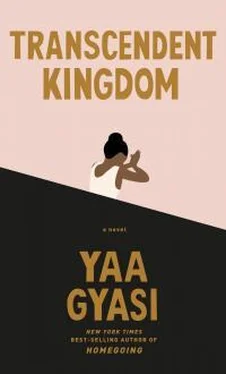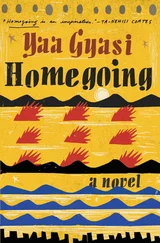The game continued on. Nana was a forward, and a good one. By halftime he had already scored two goals. The other team had one.
When the whistle blew, the boys came to join their coach on the bench, which was only a row in front of us. Nana grabbed a handful of grapes and carefully, methodically, started plucking them off the stem and popping them into his mouth while the coach talked.
On the other side, the man who’d shouted grabbed his son by the root of his sweat-soaked hair. “Don’t you let them niggers win. Don’t let them score another goal on you, you hear me?”
Everyone heard him. We’d only spent a little over half an hour in the company of this man, and yet it was already clear that he liked to be heard.
I was too young to understand the word the man had used, but I was old enough to understand the change in atmosphere. Nana didn’t move, nor did the Chin Chin Man, but still everyone was staring at the three of us, the only black people on the field that day. Was “them niggers” simply a grammatical error, or was the plural supposed to include my father and me? What would we win? What was that man in danger of losing?
Nana’s coach cleared his throat and muttered some half-hearted words of encouragement in an attempt to distract everyone. The whistle blew and the boys from both teams rushed back onto the field, but not Nana. He looked up toward the bleachers at the Chin Chin Man, who was sitting there with me on his lap. Nana’s look was a question, and I couldn’t see my father’s face, but I soon knew how he answered.
Nana ran onto the field, and for the rest of that half he was little more than a blur, moving not with the elegance my father associated with soccer, but with pure fury. A fury that would come to define and consume him. He scored goal after goal, even stealing the ball from his own teammates at certain points. No one checked him. The angry parent’s rage was written in the bright red of his face, but even he didn’t say anything else, though I’m sure his son paid the price for that rage in the car on the way home.
By the end of the game, Nana was spent. His shirt was so drenched in sweat that it clung to his body, so tight you could see the outline of his ribs as he panted and panted.
The Chin Chin Man stood up as the referee blew the closing whistle. He brought his hands to his mouth and let out a loud, long cheer. “Mmo, Mmo, Mmo. Nana, way ɛ ade.” He picked me up and danced me around the bleachers, our dance not elegant or precise but messy, exuberant, loud. He kept cheering this cheer—Good job, Good job, Good job—until Nana, embarrassed, cracked a smile. The fury fled. Though the occasion for this moment was a somber one, the moment itself was joyful. Getting in the car that day, Nana and I were so happy, glowing in the warmth of our father’s pride, delighted by Nana’s accomplishments. Looking at us then, two laughing, playful children and their warm, doting father, it would be easy to assume that we’d all but forgotten what that man had yelled. That we’d forgotten we had any cares at all. But the memory lingered, the lesson I have never quite been able to shake: that I would always have something to prove and that nothing but blazing brilliance would be enough to prove it.
13
When Nana started playing soccer, my parents started fighting about food. There was, as was typical of team sports, a rotating snack schedule. Every third week, it was my family’s turn to provide the oranges, grapes, and Capri Suns that all the moms called “Rocket Fuel” for the sixteen other boys on the team. At halftime, the Rockets would suck the juice from the orange wedges, leaving the flesh of the fruit behind. “Such waste,” my mother said whenever she came to a game to find the sidelines littered with wedges, little land mines of uneaten fruit, of privilege. My family was always attuned to such waste: chicken left on the bone by diners too polite to eat with their hands, crusts cut off of sandwiches for children who took only a single bite and left the rest. I was at an age where I was trying picky eating on for size, pushing all the tomatoes to the edges of my plate in silent refusal. My mother let this go on for two days. On the third day she put a switch on the table and stared me down. She didn’t have to say a word. I had gotten the switch only once before, the day I’d whispered “damn” into the silent sanctuary of the First Assemblies. The word had echoed through that holiest of holies; the echo found my mother; my mother found the switch. Afterward, her hands had trembled so violently, I thought she would never do it again, so when the switch appeared on the table that night, I suspected she was bluffing. I eyed her, eyed the switch, eyed the clock. By midnight, six hours after I’d begun my dinner, with tears in my eyes and terror in my heart, I ate the last of the tomatoes.
Nana had never been a picky eater. To feed his height, he ate everything he could. Nothing was safe. My mother knew, down to the cent, what every scrap of food in our house cost. After every trip to the grocery store, she would sit at the kitchen table and pore over the receipts, highlighting numbers and making lists. If the Chin Chin Man was there, she would shout some figure at him and say, “These children are going to eat us out of home and house.”
She and the Chin Chin Man started watering down the orange juice. Like chemists performing a punishing experiment, they would collect the empty gallon jugs, fill them a quarter of the way with orange juice, and flood the rest with water, until the color of the liquid inside could no longer be called orange, until the drink could no longer be called juice. Nana and I stopped drinking it, but Nana didn’t stop eating. Cereal, granola bars, fruit, the leftover rice and stew. He ate and ate and ate, and seemed to grow taller with every bite.
My parents started hiding whatever food could be hidden. Open a drawer and look in the very back and you might find an Ovaltine cracker. Nestled between stacks of clothing in their closet were the bananas.
“Here’s what we do,” Nana said when the Cheerios went missing one day when both of our parents were at work and the two of us were left to our own devices, to our hunger. “We’ll split up. You check the low places and I’ll check the high places.”
We opened every drawer, looked atop every shelf, and collected our booty in the middle of the living room. There were all the things we’d expected to be hidden, and many more things we didn’t even know we had. At age four, I was already a fiend for Malta. I liked to suck down the bitter foam from the top of the bottle and drink in large gulps. I would have had one every day, for every meal, if I could have, but I’d been told it was a party drink only, unavailable on regular days. But now there it was, along with all the other forbidden fruits.
Nana and I tore into the food and drinks, giggling. We had only about an hour before the Chin Chin Man returned home, and we knew that all the food would need to go back exactly where we’d found it. Nana ate chocolate and Cheerios, I sipped a Malta slowly, savoring the sweet barley taste, and at dinner that night, seated across the table from each other while our parents passed around bowls of light soup, we would catch each other’s eyes and grin, sharing our tasty secret.
—
“Who did this?” my mother said, pulling an empty granola bar wrapper from the trash. The jig was up. Nana and I had been careful, but clearly not careful enough. Even the trash wasn’t safe from our mother’s exacting eye.
“Who did this? Where did you find it?”
I burst into tears, giving us away. I was ready to confess to all of our crimes, but the Chin Chin Man chimed in. “Leave the kids alone. Do you want them to starve? Is that what you want?”
Читать дальше












